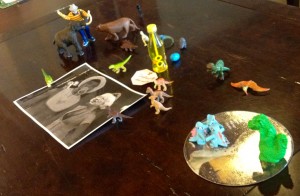 Recently, Ryan Boudinot wrote an essay for The Stranger titled “Things I Can Say About MFA Writing Programs Now That I No Longer Teach in One“. Among other things, he observed:
Recently, Ryan Boudinot wrote an essay for The Stranger titled “Things I Can Say About MFA Writing Programs Now That I No Longer Teach in One“. Among other things, he observed:
Either you have a propensity for creative expression or you don’t. Some people have more talent than others. That’s not to say that someone with minimal talent can’t work her ass off and maximize it and write something great, or that a writer born with great talent can’t squander it. It’s simply that writers are not all born equal. The MFA student who is the Real Deal is exceedingly rare, and nothing excites a faculty adviser more than discovering one. I can count my Real Deal students on one hand, with fingers to spare.
This is, in my opinion, wrong-headed, elitist, and insulting. Other people have replied eloquently. Chuck Wendig said:
This is one of the worst, most toxic memes that exists when it comes to writers. That somehow, we slide out of the womb with a fountain pen in our mucus-slick hands, a bestseller gleam in our rheumy eyes. We like to believe in talent, as if it’s a definable thing “” as if, like with the retconned Jedi, we can just take a blood test and look for literary Midichlorians to chart your authorial potential. Is talent real? Some genetic quirk that makes us good at one thing, bad at another? Don’t know, don’t care.
What I know is this: your desire matters. If you desire something bad enough, if you really want it, you will be driven to reach for it. No promises you’ll find success, but a persistent, almost psychopathic urge forward will allow you to clamber up over those muddy humps of failure and into the eventual fresh green grass of actual accomplishment.
Writers are not born. They are made. Made through willpower and work. Made by iteration, ideation, reiteration. Made through learning “” learning that comes from practicing, reading, and through teachers who help shepherd you through those things in order to give your efforts context.
(As with all of Chuck’s posts, worth clicking through to read in its entirety)
Write what you want, read what you want… but don’t look down your nose at anyone else for what they write or read. The truth is there’s no such thing as a sellout, and if you think there is, you’re wrong. We’re writers. We tell stories and if you want to claim the writing moral high ground because you’re “literary,” have I got news for you: Twain was a genre writer. Poe was a genre writer. So was Dickens. And Hemingway. Steinbeck. Hawthorne. Melville. I could go on and on, but let’s end with this: so are you. Dress it up how you want, literary fiction is a genre, too.
(Also worth clicking through to read.)
And my reaction is much the same as theirs.
A Small Confession
I will confess now. I have one of those literary degrees. Mine’s fairly highfalutin’; I got it from the Writing Seminars of the Johns Hopkins University, where the people I studied with included John Barth, Steve Dixon, Jean McGarry, and Madison Smartt Bell. Post-degree, I stuck around on fellowship for a while.
And I think what Boudinot is mistaking for talent is more the result of working with students who have both been hampered by the educational system and also just not having done enough of the three things you must do in order to be a good writer. (Will I reveal them? Sure. Keep reading.)
Writing is hard. Think of what happens with words, how a reader interprets them, how they may bring meanings with them that the writer never anticipated. How a scene is constructed from the trail of words on the page by means of evoking certain things in the reader’s head.
That’s magic. That’s amazing. That’s… an act so profoundly unlikely and amazing that it humbles me every time I set out to do it.
I am speaking as one of the people who has been told they are talented. I know I have a facility with language. But I think it says more about my education and reading as a child/teen than anything else, because I read and read and read, and did it all over the place, including one summer where I steadily worked my way through the folklore and mythology section of the children’s library, because I’d exhausted all the fiction.
Writing 1,000,000 Words
There is an axiom in some circles: to get good, genuinely good, at writing, you must write 1,000,000 words. This is not an exact science, but as a rule of thumb, it is not a terrible one.
But it is not entirely true. To become a good writer, you must perform a combination of three things.
- You must write. You must write and write and write. At first it will be hard to know how to get a character across the room. Later you will learn more complicated things. Writing will always get more complicated, in my experience, but we learn to trust ourselves to sit down with a blank page and know that we will emerge with a story.
- You must read. You must read good stuff, and try to figure out what makes it good. You must read appealing stuff, and try to understand how its draw is created. You must read amazing stuff that makes you weep because you will never be that good, and then you must go and try to be that good nonetheless.
- You must think. You must notice the world around you and try to understand it. You must exercise empathy and try to pry into some of the secrets of the human heart and psyche, even if it means admitting some things about yourself in the process.
This is something I tell my class, because I know it is true. I have been seeing it in action for almost three decades now. If you write and think about writing, you will get better, even if people are actively trying to hamper you. That is the secret of teaching writing. I can help you get better more quickly in a class, but the degree to which is entirely up to you and how much effort you are willing to put in.
There are Mozarts, natural geniuses. I think they are far fewer and farther in between than people are willing to admit. There are writers who read deeply as children. I was one and it gave me a head start. There are writers who started writing and sending out early. There are writers who set out to imitate their heroes and worked doggedly to do so. That is the norm.
Are there terrible writers who will never get better? Well. There are some getting better a lot slower than others, and I would suspect often it’s a case of a lack of number three. But better? If you do something often enough, you will get better at it eventually. And that’s what is, to my mind, important.
Enjoy this writing advice and want more content like it? Check out the classes Cat gives via the Rambo Academy for Wayward Writers, which offers both on-demand and live online writing classes for fantasy and science fiction writers from Cat and other authors, including Ann Leckie, Seanan McGuire, Fran Wilde and other talents! All classes include three free slots.
Prefer to opt for weekly interaction, advice, opportunities to ask questions, and access to the Chez Rambo Discord community and critique group? Check out Cat’s Patreon. Or sample her writing here.










25 Responses
@Catrambo I had no idea you studied with Madison! (I studied with him at Goucher. Forgot he also did the Hopkins program.)
RT @Catrambo: Writers and Natural Talent: More About that MFA essay http://t.co/Kl3r6TU4jx
RT @Catrambo: Writers and Natural Talent: More About that MFA essay http://t.co/Kl3r6TU4jx
@Catrambo I’m reminded of Gene Wolfe’s comment that he wasn’t born with talent. What he has he learned.
@Catrambo Loved this post. Here, here!
@Catrambo “I wanted to hear the music so bad.” I may try to find the exact quote later.
Cat’s thoughts on the Boudinot MFA essay. #AmWriting http://t.co/erkhTCnE72
RT @coolvstar650: Cat’s thoughts on the Boudinot MFA essay. #AmWriting http://t.co/erkhTCnE72
I like what @Catrambo has to say about Boudinot’s MFA article: http://t.co/khwZyK9z5L
RT @Catrambo: Writers and Natural Talent: More About that MFA essay http://t.co/Kl3r6TU4jx
Danielle Myers Gembala liked this on Facebook.
RT @Catrambo: Writers and Natural Talent: More About that MFA essay http://t.co/UFo9gq2ivM Well said!
I’m hearing a lot of emotional overreaction in this debate (not in what you say, I mean in the debate in general). I read the original essay when it was posted, and thought, Uh oh, here it comes….
And yep. Came the explosion.
I think Wendig’s post is the best because it’s full of bees.
His post is hysterical, actually, in a couple different senses of the term.
Sarah E Olson liked this on Facebook.
Tom Carpenter liked this on Facebook.
Quill Shiv liked this on Facebook.
Another sane voice: “@Catrambo: Writers and Natural Talent: More About that MFA essay http://t.co/SF0VlxcLtm“
RT @Catrambo: Writers and Natural Talent: More About that MFA essay http://t.co/Kl3r6TU4jx
Tom Fritter liked this on Facebook.
Kim Douglas liked this on Facebook.
Stephen McCracken liked this on Facebook.
Malia Kawaguchi liked this on Facebook.
Carla Dugas liked this on Facebook.